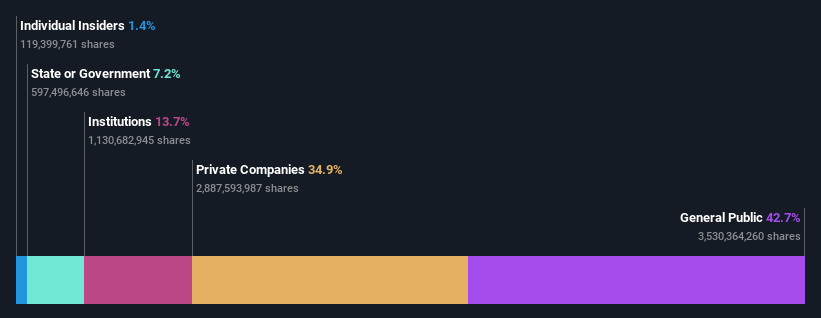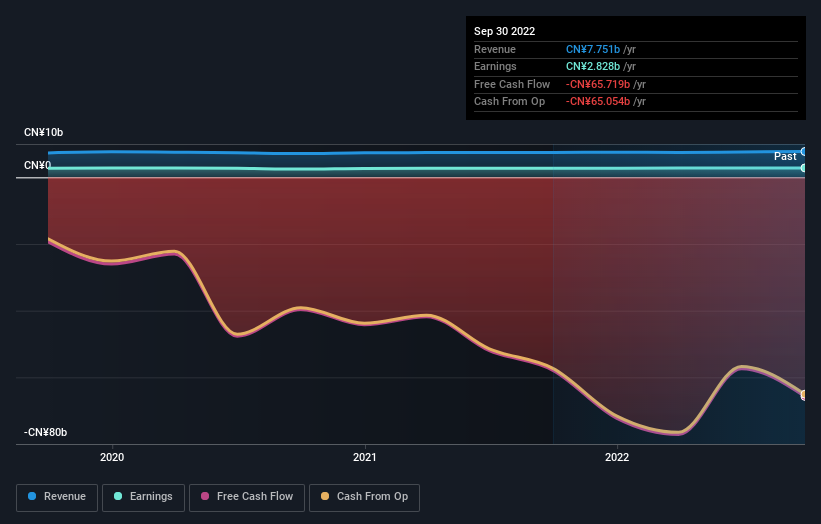Individual investors among Bank of Zhengzhou Co., Ltd.'s (HKG:6196) largest stockholders and were hit after last week's 5.3% price drop

Key Insights
- The considerable ownership by individual investors in Bank of Zhengzhou indicates that they collectively have a greater say in management and business strategy
- A total of 21 investors have a majority stake in the company with 50% ownership
- Insiders have sold recently
To get a sense of who is truly in control of Bank of Zhengzhou Co., Ltd. (HKG:6196), it is important to understand the ownership structure of the business. We can see that individual investors own the lion's share in the company with 43% ownership. That is, the group stands to benefit the most if the stock rises (or lose the most if there is a downturn).
As a result, individual investors as a group endured the highest losses last week after market cap fell by HK$496m.
Let's delve deeper into each type of owner of Bank of Zhengzhou, beginning with the chart below.
Check out our latest analysis for Bank of Zhengzhou

What Does The Institutional Ownership Tell Us About Bank of Zhengzhou?
Institutional investors commonly compare their own returns to the returns of a commonly followed index. So they generally do consider buying larger companies that are included in the relevant benchmark index.
Bank of Zhengzhou already has institutions on the share registry. Indeed, they own a respectable stake in the company. This implies the analysts working for those institutions have looked at the stock and they like it. But just like anyone else, they could be wrong. If multiple institutions change their view on a stock at the same time, you could see the share price drop fast. It's therefore worth looking at Bank of Zhengzhou's earnings history below. Of course, the future is what really matters.

We note that hedge funds don't have a meaningful investment in Bank of Zhengzhou. Zhengzhou Municipal Finance Bureau is currently the largest shareholder, with 7.2% of shares outstanding. For context, the second largest shareholder holds about 5.4% of the shares outstanding, followed by an ownership of 4.2% by the third-largest shareholder.
Looking at the shareholder registry, we can see that 50% of the ownership is controlled by the top 21 shareholders, meaning that no single shareholder has a majority interest in the ownership.
While studying institutional ownership for a company can add value to your research, it is also a good practice to research analyst recommendations to get a deeper understand of a stock's expected performance. Our information suggests that there isn't any analyst coverage of the stock, so it is probably little known.
Insider Ownership Of Bank of Zhengzhou
While the precise definition of an insider can be subjective, almost everyone considers board members to be insiders. Management ultimately answers to the board. However, it is not uncommon for managers to be executive board members, especially if they are a founder or the CEO.
Insider ownership is positive when it signals leadership are thinking like the true owners of the company. However, high insider ownership can also give immense power to a small group within the company. This can be negative in some circumstances.
Our most recent data indicates that insiders own some shares in Bank of Zhengzhou Co., Ltd.. This is a big company, so it is good to see this level of alignment. Insiders own HK$276m worth of shares (at current prices). Most would say this shows alignment of interests between shareholders and the board. Still, it might be worth checking if those insiders have been selling.
General Public Ownership
The general public, who are usually individual investors, hold a 43% stake in Bank of Zhengzhou. While this group can't necessarily call the shots, it can certainly have a real influence on how the company is run.
Private Company Ownership
It seems that Private Companies own 35%, of the Bank of Zhengzhou stock. Private companies may be related parties. Sometimes insiders have an interest in a public company through a holding in a private company, rather than in their own capacity as an individual. While it's hard to draw any broad stroke conclusions, it is worth noting as an area for further research.
Next Steps:
While it is well worth considering the different groups that own a company, there are other factors that are even more important. To that end, you should learn about the 3 warning signs we've spotted with Bank of Zhengzhou (including 2 which make us uncomfortable) .
Of course this may not be the best stock to buy. So take a peek at this free free list of interesting companies.
NB: Figures in this article are calculated using data from the last twelve months, which refer to the 12-month period ending on the last date of the month the financial statement is dated. This may not be consistent with full year annual report figures.
If you're looking to trade Bank of Zhengzhou, open an account with the lowest-cost platform trusted by professionals, Interactive Brokers.
With clients in over 200 countries and territories, and access to 160 markets, IBKR lets you trade stocks, options, futures, forex, bonds and funds from a single integrated account.
Enjoy no hidden fees, no account minimums, and FX conversion rates as low as 0.03%, far better than what most brokers offer.
Sponsored ContentValuation is complex, but we're here to simplify it.
Discover if Bank of Zhengzhou might be undervalued or overvalued with our detailed analysis, featuring fair value estimates, potential risks, dividends, insider trades, and its financial condition.
Access Free AnalysisHave feedback on this article? Concerned about the content? Get in touch with us directly. Alternatively, email editorial-team (at) simplywallst.com.
This article by Simply Wall St is general in nature. We provide commentary based on historical data and analyst forecasts only using an unbiased methodology and our articles are not intended to be financial advice. It does not constitute a recommendation to buy or sell any stock, and does not take account of your objectives, or your financial situation. We aim to bring you long-term focused analysis driven by fundamental data. Note that our analysis may not factor in the latest price-sensitive company announcements or qualitative material. Simply Wall St has no position in any stocks mentioned.
About SEHK:6196
Bank of Zhengzhou
Provides various banking products and services in the People’s Republic of China.
Flawless balance sheet with proven track record.
Market Insights
Community Narratives




